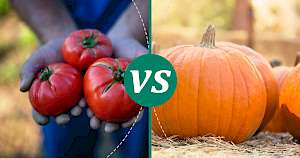Pumpkin vs Tomato: Nutrition & Calories Compare


Pumpkin vs Tomato
Nutrition Facts
Serving size:
change
5g10g15g20g30g40g50g60g80g100g120g140g160g180g200g220g250g300g350g400g450g500g600g700g800g900g1000g
1oz2oz3oz4oz5oz6oz7oz8oz10oz12oz15oz20oz25oz30oz35oz40oz50oz
Amount Per Serving:
Serving size:
change
5g10g15g20g30g40g50g60g80g100g120g140g160g180g200g220g250g300g350g400g450g500g600g700g800g900g1000g
1oz2oz3oz4oz5oz6oz7oz8oz10oz12oz15oz20oz25oz30oz35oz40oz50oz
Amount Per Serving:
Pumpkin vs Tomato 100g Compare
| per 100g | Pumpkin | Tomato |
|---|---|---|
| Calories | 26 | 18 |
| Carbohydrates | 6.5 g | 3.9 g |
| Fat | 0.1 g | 0.2 g |
| Dietary fiber | 0.5 g | 1.2 g |
| Protein | 1 g | 0.9 g |
| Calcium | 21 mg | 10 mg |
| Iron | 0.8 mg | 0.3 mg |
| Magnessium | 12 mg | 11 mg |
| Phosphorus | 44 mg | 24 mg |
| Potassium | 340 mg | 237 mg |
| Sodium | 1 mg | 5 mg |
| Zink | 0.32 mg | 0.17 mg |
| Vitaminium A | 7384 µg | 833 µg |
| Vitaminium B1 (Thiamine) | 0.05 mg | 0.037 mg |
| Vitaminium B3 (Niacin) | 0.6 mg | 0.594 mg |
| Vitaminium B6 | 0.061 mg | 0.08 mg |
| Vitaminium B9 (Folic acid) | 16 mg | 15 mg |
| Vitaminium C | 9 mg | 13 mg |
| Vitaminium E | 1.06 mg | 0.54 mg |
| Vitaminium K | 1.1 µg | 7.9 µg |
| Beta karoten | 3100 mg | 101 mg |
Delving Into the World of Pumpkins and Tomatoes
Before we dive into the nutritional battle between pumpkin and tomato, let's appreciate some fascinating facts about these two kitchen staples. Pumpkins, with their rich history, are not only a symbol of fall and a centerpiece of Halloween but also a highly versatile vegetable used in soups, pies, and even as a decorative item. On the other hand, tomatoes, with their vibrant color and juicy texture, are a cornerstone of various cuisines around the world, adding flavor to salads, sauces, and countless dishes.
Calories and Macronutrients: A Closer Look
When it comes to calories, tomatoes edge out pumpkins with a lower count, having only 18 calories per 100 grams compared to pumpkin's 26 calories. This makes tomatoes an excellent choice for those watching their calorie intake.
In terms of carbohydrates, pumpkins have a higher content at 6.5g per 100 grams, while tomatoes contain 3.9g. However, tomatoes take the lead in fiber with 1.2g, a bit more than the 0.5g found in pumpkins, aiding in digestion and providing a feeling of fullness.
Both are low in fat, but tomatoes offer slightly more at 0.2g compared to pumpkin's negligible 0.1g. Protein levels are nearly the same, with pumpkins slightly ahead at 1g per 100 grams versus tomatoes' 0.9g.
Minerals and Vitamins: The Essentials
Pumpkins shine in the vitamin department, especially with their vitamin A content at 7384 IU, significantly higher than the 833 IU found in tomatoes. This makes pumpkins an excellent choice for eye health and immune function.
Both vegetables provide a good dose of essential minerals such as calcium, magnesium, and potassium, but pumpkins generally offer more. For instance, they have 340mg of potassium per 100 grams compared to tomatoes' 237mg, supporting heart health and muscle function.
However, tomatoes are not to be underestimated. They boast a higher vitamin C content at 13mg per 100 grams, surpassing pumpkins' 9mg. This makes tomatoes a great choice for skin health and immunity.
What Does This Mean for Your Diet?
Choosing between pumpkin and tomato ultimately depends on your dietary needs and preferences. If you're seeking to increase your vitamin A intake or need a boost in potassium, pumpkin might be the way to go. On the other hand, if you're looking for a low-calorie option that's rich in vitamin C and dietary fiber, tomatoes could be more beneficial.
Regardless of your choice, both pumpkins and tomatoes offer a wealth of nutrients that can contribute to a balanced and healthy diet. Incorporating a variety of vegetables into your meals is key to getting the broad spectrum of vitamins and minerals your body needs to function at its best.
In conclusion, while the nutritional profiles of pumpkins and tomatoes differ in certain aspects, both are nutritious in their own right and can be enjoyed in a multitude of delicious ways. Whether you're carving a pumpkin for Halloween or slicing a tomato for your salad, you're making a choice that supports good health.
Pumpkin 100g
26kcalCalories source
- 84% CARBS.
- 13% PROTEIN
- 3% FAT
Tomato 100g
18kcalCalories source
- 74% CARBS
- 17% PROTEIN
- 9% FAT
Compares of pumpkin
- Pumpkin vs Asparagus
- Pumpkin vs Bamboo Shoots
- Pumpkin vs Beetroot
- Pumpkin vs Pepper
- Pumpkin vs Bitter Melon
- Pumpkin vs Calabash
- see all compares of pumpkin
Marcin Piotrowicz
calories-info.com creator
Healthy diet and healthy lifestyle promoter
Add comment